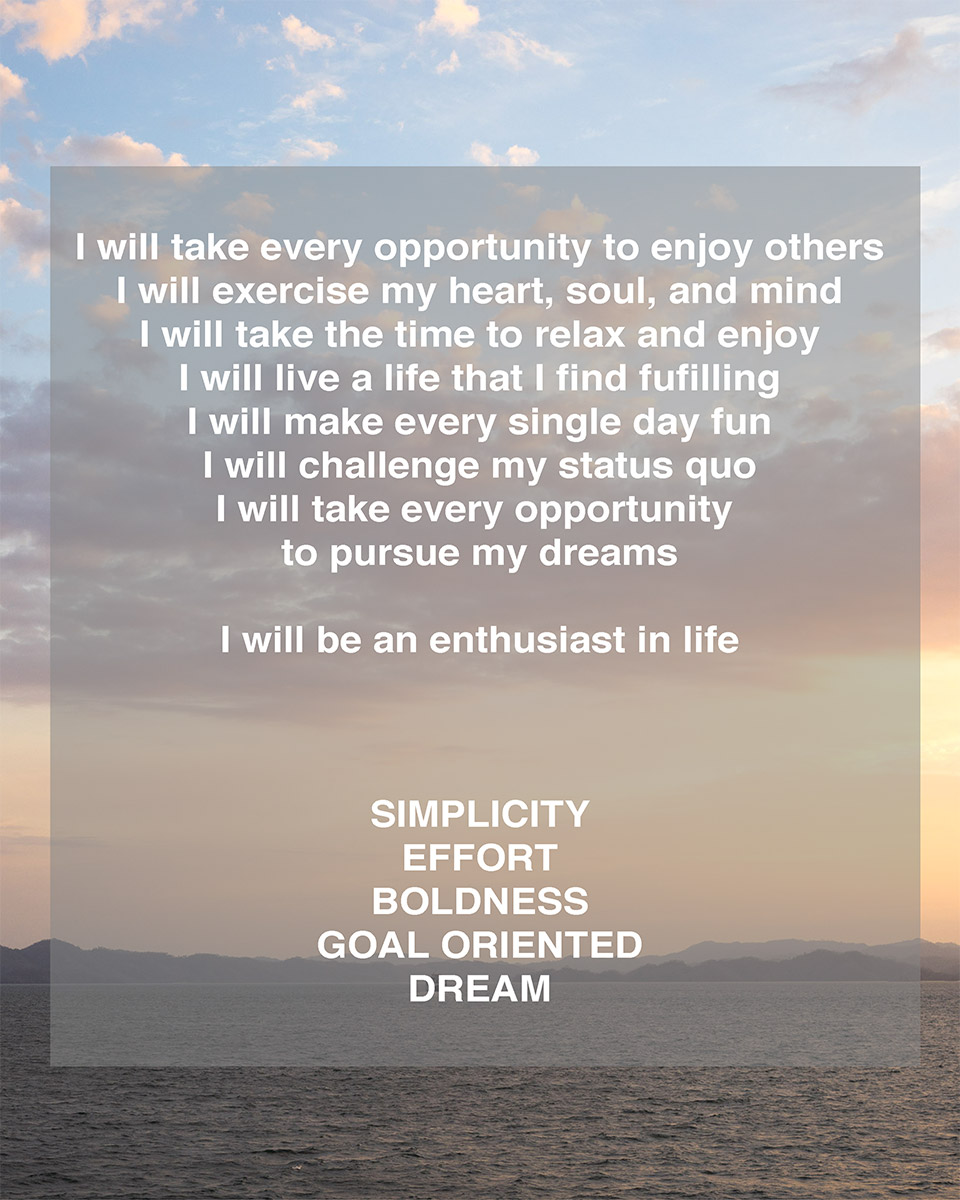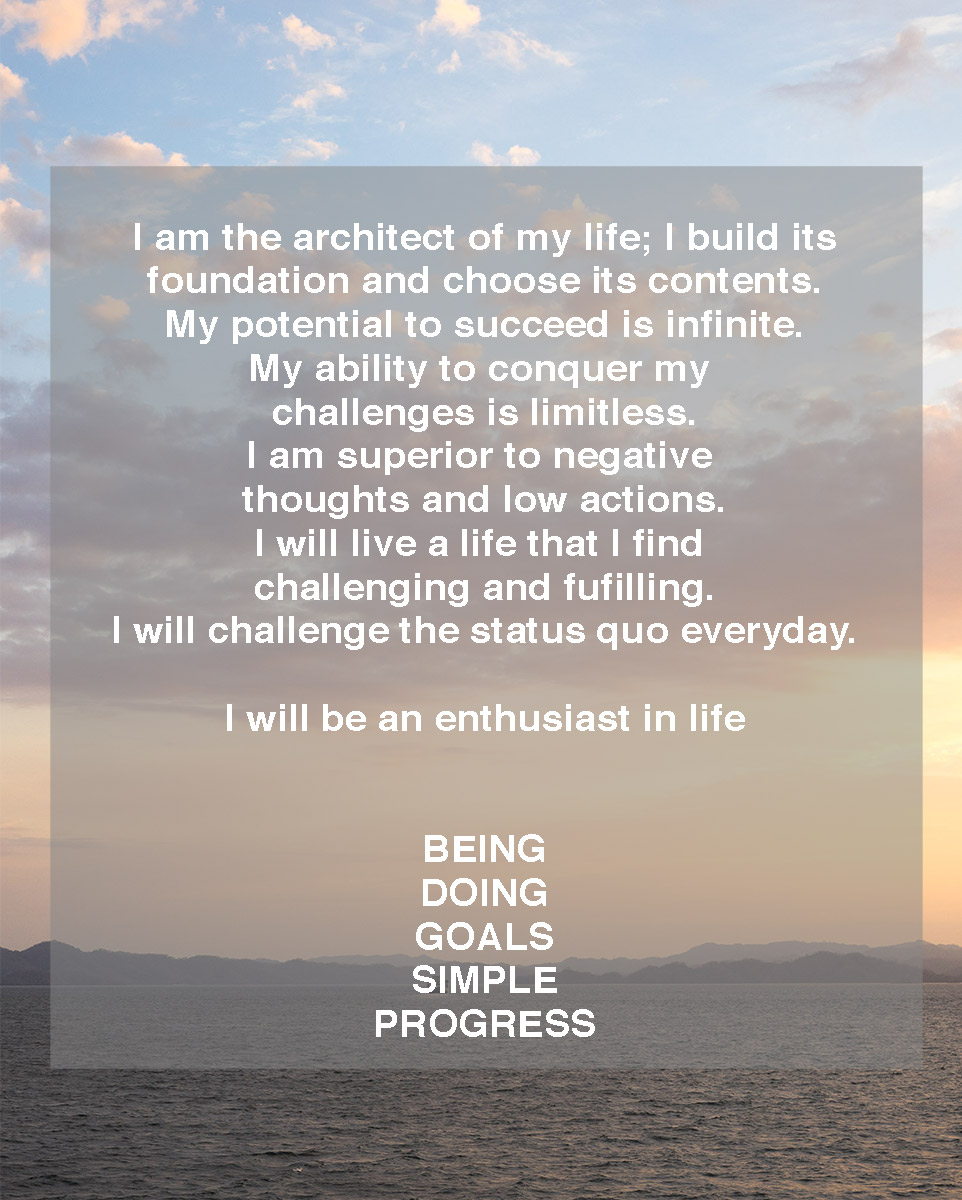Living a Value Dense Life
in Thoughts on Philosophy
One of the best ways to stay true to yourself is to establish core values. What are you willing to do or not do along the way? What are you willing to accept or not accept? It's important to define your values and ethical standards to keep true to who you are at your core. —Tim Ferriss
Table of Contents
- Finding Purpose and Earning 3 College Credits
- What Exactly is a Value Dense Life?
- Why Don’t People Live a Value Filled Life?
- What Makes a Good Value System?
- My 2018 Value System
- Being
- Doing
- Goals
- Simple
- Progress
Finding Purpose and Earning 3 College Credits
About a year ago, I was sitting in my room, staring at the list of classes I was supposed to be taking in 3 months when the summer ended, and the semester started up again. I had recently switched out of CS and engineering in general, and I was feeling pretty lost. I wasn’t sure what I really wanted to do with my life, and the classes I was going to be taking reflected that.
It was while I was browsing the list of design classes, that I came across a class that would really have an impact on my life: Finding Your Purpose with Dr. Heywood. While I found it odd that there would be a design class called Finding Your Purpose, the ratemyprofessor reviews were pretty good, and worst-case case scenario the class would be an easy A.
And they were right. The class was an easy A. Dr. Heywood was a fantastic lecturer with many personal anecdote’s that were fun to hear. As easy as the class was however, I wasn’t prepared for how much it would challenge who I am. Dr. Heywood would make us face difficult questions about the direction our life was going, and what direction we wanted it to take.
What I thought would be an easy A ended up being more like jumping in the deep end with a weight attached to my ankles. I began to seriously re-evaluate my life and determine if it was the kind of life I wanted to live. This caused me to make drastic changes in all aspects of my life, from the people I hung around to my diet and even to my morning routine. The end result was a series of affirmations and values represented in what we called our “vision board”:
 To this day, I still keep my vision board on a wall in my room so that I see it every morning.
To this day, I still keep my vision board on a wall in my room so that I see it every morning.
Dr. Heywood’s class was challenging. It was also one of the most rewarding classes I have taken. However, his class was just an introduction to living a value dense life. Since then, the process has just continued to unfold and develop, now with me as an active participant.
What Exactly is a Value Dense Life?
Of course, before one can begin living a value dense life, it helps to know exactly what a value filled life is. And that starts with what exactly a value is. This could be a long, long question that is worthy of its own blog post. Instead, I’ll cheat and use author and philosopher Ayn Rand’s objectivism answer: Value can only exist if there is something to gain or lose.
A value is a way of determining what one should be doing to maximize the gains they want and avoid the losses they don’t want. Values, in short, help us determine where to put our energy and focus so that we can gain (happiness, peace, money, etc) and avoid loss (health, freedom, etc).
A value dense life is a life that’s rich with your values. Life is limited in the time, energy, financial and personal resources we have. A value dense life helps one maximize these resources towards creating the life they want.
Why Don’t People Live a Value Filled Life?
Values are difficult to live by. They’re even more difficult to find. There’s a long, lengthy process of trial and error. Moments when you think you found what’s really important followed by lows of feeling lost. It can become easy to get side tracked and return to old, self destructive habits. Why waste time finding a set values when it’s easier to find immediately rewarding activities? I find psychologist Jordan Peterson’s response to a similar version of this question to be incredibly insightful here. “Why do young people party and procrastinate instead of pursuing something with more value?”
"Because they don't have a value hierarchy... (they're) only considering the immediate time frame. And the problem is, things propagate across all the time frames. Just because something works really well this second... doesn't mean that it is a tenable solution to the class of all problems." - Jordan Peterson
I don’t believe that partying or drinking or other “immediate timeframe” solutions are necessarily bad. It can be great to unwind every once in a while. But I agree with Jordan Peterson: “the medium to long term consequences are risky”.
What Makes a Good Value System?
I also agree with Peterson’s solution to this problem: a value hierarchy to guide one’s life. But what exactly is a value hierarchy and what exactly makes a value hierarchy “good”? Once again I believe Jordan Peterson presents excellent answer in his book 12 Rules For Life: An Antidote for Chaos. A value hierarchy is a system for determining the priority or importance one places on their values. The three criteria for a good value system are:
- It must provide structure
- It must point to a higher order (something bigger)
- It must be internalized (and along with that, be able to be internalized)
These criteria are critical. Without structure, what’s the point of having that value system? It provides no benefit over the status quo of not having one. If your value system doesn’t point to doing something bigger with your life, is it really leading you in the right direction? Bigger is not as much about success as it is about improving oneself, and to me, this is one of the most important parts of a value system. Finally, if the value system can’t be internalized, what good is it? If you can’t live by that set of values, it likely means that they are either unrealistic, or you must start smaller and build up to these bigger values. And without a value system that fufills this criteria, you’re what Peterson calls “an adult two year old”.
My 2018 Value System
With all that I’ve learned, here is my updated, 2018 value hierarchy. While I’m not a fan of constant changes and updates to one’s value system (I believe Dr. Heywood recommended at the least keeping the same system for several years), it would be impossible for me not to apply what I have learned over the last few months. So, here is my updated (and hopefully finalized for a while) value hierarchy, and their breakdowns.
 The updated, 2018 vision board.
The updated, 2018 vision board.
Being
This value is a bit broad, but it’s also my most important one. Part of Being is being alive, living life, and being an active participant. It’s remembering to “Be Here Now” as Ram Dass would say. Being in touch with myself through meditation and self exploration. It’s also a reflection of who I am and want to be. I want to be well read, smart, and in shape. Those to me are important, and why Being is at the top of my list.
Doing
Doing is pretty straightforward. It’s my reminder that there are certain things in life I want to be doing every single day. Eating healthy, remaining active, being socially responsible. Doing is also about what I want to be doing. It ties pretty closely with my next value, Goals, and serves as a reminder that what I am doing today should be making progress to what I want to be Being and Doing tomorrow.
Goals
Just like a good value system, I believe goals are critical towards making progress in life and improving oneself. I subscribe pretty closely to the idea that the purpose of life is to constantly be bettering oneself, and the only way to assure that is happening is by having goals. For this, I subscribe to Tim Ferriss’s “Dreamlines”. The idea is simple: You have a 6 month timeline. There are 3 types of “dreams” (goals): BEING, DOING, and HAVING. Being is what you want to be, Doing is what you want to do, and Having is what you want to have. Each of these should have no more than 5 dreams. I find that this system (although I’m still experimenting with it) is a great way to come up with honest, realistic goals that can be acomplished in 6 months, yet still challenge one to grow. They also help reduce the pressure of having goals. Some goals are minor, more passive ones, while others are more active. The idea is that each goal should build into one final project or experience or object you want to have.
Simple
The simplist (haha) of my goals. Simple reminds me to always keep my life simple. To reduce the amount of items and responsibilities I have so that I can focus only on the things that matter. Life is pretty simple, and we have a nasty habit of overcomplicating it. So keep it stupid simple.
Progress
This one ties very closely with goals. Goals are what I set for myself to acomplish, while progress is me taking steps towards acomplishing them. Everyday I hope to make progress towards being better than the day before. I have pretty simple system for checking this: everyday I try to ask myself, am I physically, mentally, and spiritually better than I was the day before? If not, what changes should I be making? If too many days in a row pass with me answering no to this question, I know I need to make a drastic change in my life.
Some of these values are the same as my original; others are pretty new. I’m optimistic that this set can last me a while, but I also won’t rule out any potential changes I can make. A solid set of values can improve one’s life, and I can’t wait to see where these values take me.